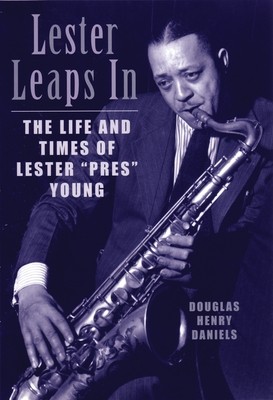
- We will send in 10–14 business days.
- Author: Douglas H Daniels
- Publisher: Beacon Press
- ISBN-10: 0807071250
- ISBN-13: 9780807071250
- Format: 15.8 x 23.7 x 3.5 cm, softcover
- Language: English
- SAVE -10% with code: EXTRA
Reviews
Description
He was jazz's first hipster. He performed in sunglasses and coined and popularized phrases like that's cool and you dig? He always wore a suit and his trademark porkpie hat. He influenced everyone from B. B. King to Stan Getz to Allen Ginsberg, creating a lyrical style of playing that forever changed the sound of the tenor saxophone.
In this groundbreaking biography of Lester Young (1909-1959), historian Douglas Daniels brings to life the man and his world, and corrects a number of misconceptions. Even though others have identified Young as a Kansas City musician, Daniels traces his roots to the blues of Louisiana and his early years traveling with his father's band and the legendary Oklahoma City Blue Devils. Later we see the jazz culture of New York in the early 1940s, when Young was launched to national and international fame with the Count Basie Orchestra and began to accompany his close friend Billie Holiday. After a year spent in an Army prison on a conviction for marijuana use, Young made changes in his music but never lost his sensitivity or soul. The first ever to gain access to Young's family and many musicians who performed with him, Daniels reconstructs the world in which Young lived and played: the racism that he and other black musicians faced, the feeling of home and family that they created together on the road, and what his music meant to black audiences. Young emerges as a kind friend, a loving parent, and a gentle and sensitive man who had, in the words of Reginald Scott, the saddest eyes I ever sawEXTRA 10 % discount with code: EXTRA
The promotion ends in 19d.23:57:41
The discount code is valid when purchasing from 10 €. Discounts do not stack.
- Author: Douglas H Daniels
- Publisher: Beacon Press
- ISBN-10: 0807071250
- ISBN-13: 9780807071250
- Format: 15.8 x 23.7 x 3.5 cm, softcover
- Language: English English
He was jazz's first hipster. He performed in sunglasses and coined and popularized phrases like that's cool and you dig? He always wore a suit and his trademark porkpie hat. He influenced everyone from B. B. King to Stan Getz to Allen Ginsberg, creating a lyrical style of playing that forever changed the sound of the tenor saxophone.
In this groundbreaking biography of Lester Young (1909-1959), historian Douglas Daniels brings to life the man and his world, and corrects a number of misconceptions. Even though others have identified Young as a Kansas City musician, Daniels traces his roots to the blues of Louisiana and his early years traveling with his father's band and the legendary Oklahoma City Blue Devils. Later we see the jazz culture of New York in the early 1940s, when Young was launched to national and international fame with the Count Basie Orchestra and began to accompany his close friend Billie Holiday. After a year spent in an Army prison on a conviction for marijuana use, Young made changes in his music but never lost his sensitivity or soul. The first ever to gain access to Young's family and many musicians who performed with him, Daniels reconstructs the world in which Young lived and played: the racism that he and other black musicians faced, the feeling of home and family that they created together on the road, and what his music meant to black audiences. Young emerges as a kind friend, a loving parent, and a gentle and sensitive man who had, in the words of Reginald Scott, the saddest eyes I ever saw

Reviews